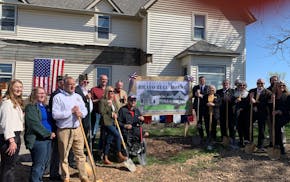Emergency first responders in Brooklyn Park, home to one of the largest concentrations of Liberians outside of Liberia, will take additional precautions in light of the Ebola outbreak that has killed nearly 700 people in three West African nations.
The city, in concert with local West African community groups, also will hold a public meeting on Sunday to discuss precautions people can take when traveling to the region.
Fire Chief Ken Prillaman has put into effect a policy under which firefighters and police officers will wear eye shields and facemasks, as well as gloves, when responding to calls involving flulike symptoms. Responders will also ask all patients with flulike symptoms, regardless of race or ethnicity, about any foreign travel.
The U.S. Centers for Disease Control and Prevention has said the likelihood of the disease spreading in the U.S. is "very remote," but Brooklyn Park is being proactive given the large population that travels to and from the affected region to visit family and conduct business.
All cases of human illness or death in the Ebola outbreak have occurred in Africa; no case has been reported in the United States, according to the CDC. The agency put the number of suspected Ebola deaths at 129 in Liberia; 319 in Guinea, and 224 in Sierra Leone.
"Our additional personal protective equipment policy is a reminder to our first responders that they should be vigilant to take care of themselves while responding to the needs of others," said Prillaman, who said the policy was first used during the H1N1 flu epidemic a few years back.
More than 30,000 people of Liberian descent live in Minnesota, primarily in the north metro area, according to city officials and African groups. Brooklyn Park estimates that 10 percent of its population — 6,000 to 8,000 people — is of Liberian descent.
"We have a strong connection with people from West Africa. We consider ourselves the world's largest Liberian city outside of Liberia. We need to be prepared if anything occurs," said Mayor Jeff Lunde.
Much talk in community
Lunde said that he attended the Liberian independence festival in Brooklyn Park on Saturday night and that the Ebola epidemic was on everyone's mind.
"Many members of the community have lost people from Ebola," he said. "It has a definite effect on people here — not physically, but psychologically."
Fire Chief Prillaman said that city officials met with leaders of the Organization of Liberians in Minnesota and that they support the proactive policy.
Zubah Kpanaku, chairman of the organization, said he backs first responders' taking precautions when presented with people with symptoms, so long as the policy is uniform and does not single out groups of people. "I would probably be doing the same thing. I would be careful if I was a medical worker," said Kpanaku, who teaches chemistry at St. Paul College.
His wife, Kulubo, is currently in Liberia visiting family, and their children are anxious for her return. "She is a registered nurse. She is trained to take precautions. I know she is helping her family members to stay safe," he said.
Kpanaku said Sunday's meeting will help others understand safety precautions and also mobilize local efforts to provide aid. "The community meeting is mostly educational and to minimize panic," he said.
CDC comments
Family and friends of people who are ill with the virus are most at risk, the CDC says.
"While it's possible that someone could become infected with the Ebola virus in Africa and then get on a plane to the United States, it's very unlikely that they would be able to spread the disease to fellow passengers," Stephan Monroe of the CDC said during a press briefing this week.
"The Ebola virus spreads through direct contact with the blood, secretions, or other body fluids of ill people, and indirect contact — for example with needles and other things that may be contaminated with these fluids," said Monroe, the CDC's deputy director of the National Center for Emerging Zoonotic and Infectious Diseases. "Most people who become infected with Ebola are those who live with and care for people who have already caught the disease and are showing symptoms."
Community efforts
"There are huge concerns," said Abdullah Kiatamba, executive director of the nonprofit African Immigrant Services in Brooklyn Park. "Folks are traveling from here to Liberia and they are coming back. Every day people go to Liberia. There is a concern that if they do not take precautions, it can be dangerous to them. There is also concern about stigmatization, that Liberians will be stigmatized as potential carriers. … We have to do everything we can do to prevent any case of Ebola in Minnesota."
Kiatamba said part of the effort also is to distribute health information back to family and friends in Africa. Kiatamba said he and others are changing their travel plans to avoid the region while the outbreak remains out of control.
"I am supposed to go to Liberia in December. I am going to change my trip. I think it's too risky," he said.
Coon Rapids resident Decontee Sawyer said her husband, Patrick, a Liberian government worker who traveled between Minnesota and West Africa for work, died from the disease. Patrick Sawyer last visited Minnesota about a year ago and planned to return in August to see the couple's three daughters. He had been caring for his ill sister, assuming she had malaria. After the sister died, authorities confirmed it was Ebola.
Shannon Prather • 612-673-4804

Hennepin County Attorney inks contract with D.C. law firm to prosecute trooper Londregan case

Defense attorneys in Feeding Our Future trial cast doubt on FBI's meal fraud investigation

Protesters hold dueling Gaza rallies at University of Minnesota

Overdose deaths spike after incarceration, but Minnesota jails lack treatment

